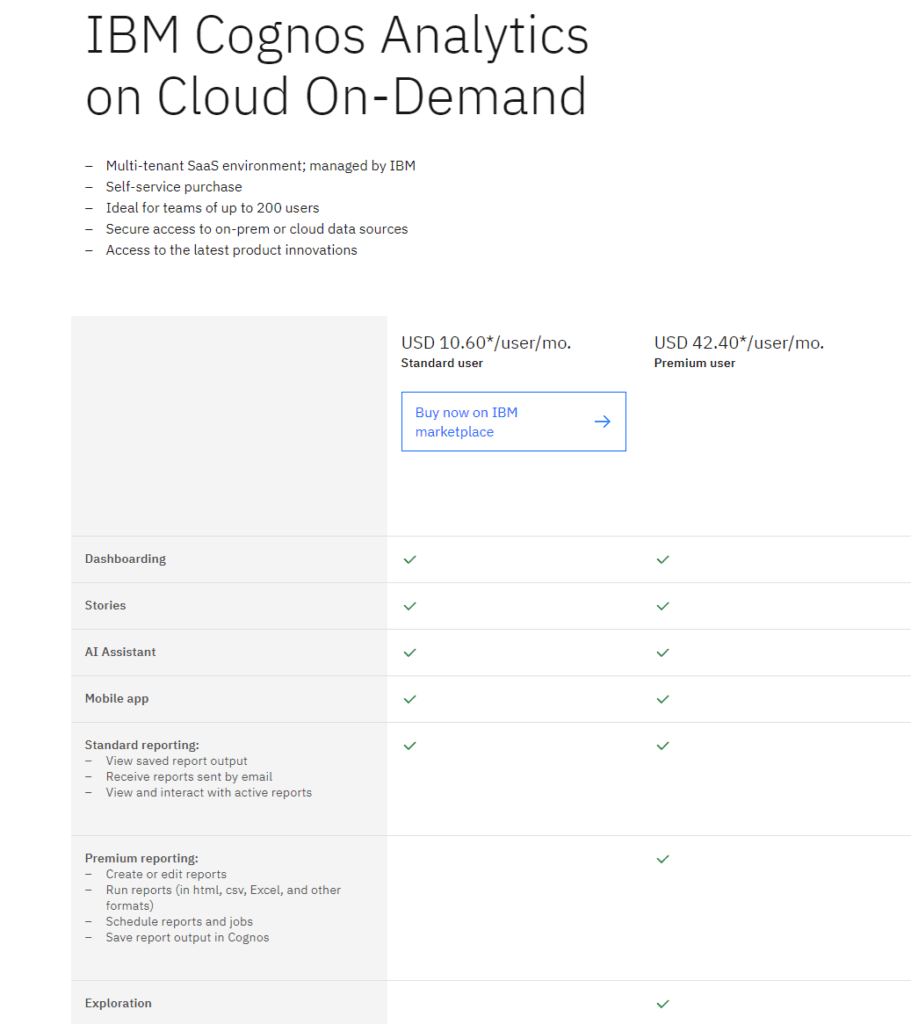In today’s fast-paced digital landscape, choosing the right analytics tool is more than a necessity—it’s a strategic decision that can shape the future of your business. With a plethora of options at your fingertips, the decision often boils down to identifying what truly matters to your organization. Two contenders that often capture the spotlight are IBM Cognos Analytics and Optimizely. Each offers unique strengths, but they cater to different aspects of data analytics and optimization. Are you leaning towards the comprehensive data analysis and reporting capabilities of IBM Cognos Analytics, or do you see more value in the experimentation and website optimization features of Optimizely? Let’s dive into a detailed comparison to help you decide which tool is the best fit for your analytical aspirations and business goals.
| IBM Cognos Analytics | Optimizely |
|---|---|
 |  |
| G2 Score – 4.0 out of 5 stars | G2 Score – 4.5 out of 5 stars |
| TrustRadius Score – 8.1/10 | TrustRadius Score – 8.7/10 |
Integration and Compatibility
In the modern digital ecosystem, the ability of an analytics tool to seamlessly integrate with your existing infrastructure and data sources is crucial. This integration not only dictates the ease of implementation but also the tool’s potential to provide actionable insights.
IBM Cognos Analytics: The Versatile Integrator
IBM Cognos Analytics is renowned for its robust integration capabilities, designed to cater to the complex and varied data landscapes of large enterprises. It supports a wide array of data sources, including relational databases, cloud services, spreadsheets, and even big data environments. This versatility ensures that organizations can leverage their existing data infrastructure, minimizing the need for costly migrations or overhauls.
The platform’s strength lies in its ability to harmonize disparate data sources, providing a unified analytics environment. This comprehensive data integration capability is essential for businesses looking to conduct in-depth analyses across multiple departments or functions. However, the breadth of Cognos Analytics’ integration features comes with a complexity that may require a dedicated IT team to manage, making it a more suitable choice for larger organizations with the resources to invest in its implementation and ongoing maintenance.
Optimizely: Focused on Digital Experience
Optimizely, with its focus on digital experience optimization, offers a different approach to integration. It excels in integrating with web and mobile platforms, making it an ideal choice for businesses looking to enhance their online presence. Optimizely’s ease of integration with content management systems (CMS), e-commerce platforms, and other digital tools enables marketers and product teams to quickly set up and run experiments without extensive technical support.
The platform’s specialized nature means that it may not offer the same level of data source integration as Cognos Analytics. However, for organizations primarily interested in optimizing their digital channels, Optimizely’s streamlined integration capabilities provide a direct path to actionable insights, allowing teams to focus on improving user experiences and conversion rates.
Analytical Depth and Reporting Capabilities
The core of any analytics tool is its ability to not only gather and integrate data but to analyze it deeply and present it in an actionable format. The depth of analysis and the flexibility of reporting capabilities can significantly influence how well a tool meets your business needs.
IBM Cognos Analytics: Deep Data Exploration
IBM Cognos Analytics is a powerhouse in the realm of data analysis, designed to cater to the nuanced needs of large enterprises. It stands out for its comprehensive analytical depth, supporting a wide range of analytical tasks from standard reporting to complex predictive and prescriptive analytics. This breadth allows users to not only understand what has happened within their business but also to forecast future trends and model potential actions.
Cognos Analytics excels in its ability to dissect and understand data through a multifaceted lens, offering advanced data visualization tools that transform complex datasets into intuitive, actionable insights. The platform’s reporting capabilities are equally robust, enabling the creation of detailed, customized reports that can cater to the specific needs of various stakeholders within an organization. From interactive dashboards that provide real-time business insights to extensive reports that dive deep into strategic analysis, Cognos Analytics ensures that businesses have the tools necessary to communicate findings effectively and drive informed decisions across all levels of the organization.
Optimizely: Focused on Experimentation and Improvement
On the other hand, Optimizely focuses on a specific aspect of data analysis, primarily catering to businesses looking to enhance their digital experiences through experimentation and personalization. While it may not offer the same level of analytical depth as Cognos Analytics, Optimizely provides valuable insights into how changes to websites, apps, and other digital platforms impact user behavior and conversion rates.
Its strength lies in enabling businesses to conduct A/B tests, multivariate tests, and more, with an ease of use that democratizes data analysis, making it accessible to marketers, product managers, and developers alike. The reporting capabilities in Optimizely are designed to highlight the outcomes of these experiments clearly and concisely, offering dashboards that track performance metrics and visualize the impact of tested variations. This focus ensures that teams can quickly understand results, make data-informed decisions to optimize digital strategies, and directly observe the effects of their efforts on user engagement and business outcomes.

Related: Check out our free SEO suite

Scalability and Performance
A critical factor for businesses when choosing an analytics platform is its ability to scale and perform under increasing loads. As your organization grows, so does the amount of data you collect and the number of users accessing your analytics tools. The platform’s scalability and performance directly impact your team’s efficiency and the accuracy of your insights.
IBM Cognos Analytics: Built for Enterprise Scale
IBM Cognos Analytics is engineered to meet the needs of large enterprises with complex data environments. It boasts high scalability, capable of handling vast amounts of data and supporting a large number of concurrent users without a dip in performance. This scalability ensures that as your business grows, Cognos Analytics can adjust to accommodate increasing data loads, more sophisticated analytics, and higher user demand.
The platform’s architecture is designed for robust performance, featuring efficient data processing capabilities to manage and analyze large datasets swiftly. Cognos Analytics’ performance is optimized for enterprise environments where timely access to insights is critical for decision-making. The tool’s ability to maintain speed and reliability, even as demands on the system grow, makes it a strong candidate for organizations anticipating significant growth or dealing with large-scale data analytics.
Optimizely: Agile Performance for Digital Experimentation
Optimizely, focusing on digital experimentation and optimization, emphasizes agility and performance tailored to rapid testing cycles. Its scalability is designed to support businesses as they expand their digital presence, ensuring that performance remains consistent even as the volume of experiments and collected data increases. Optimizely’s cloud-based infrastructure allows for flexible scaling, adapting quickly to changes in usage and data collection needs without requiring manual intervention.
The platform’s performance strengths lie in its ability to deliver real-time insights into user behavior and test results, enabling teams to make swift, informed decisions about digital strategies. Optimizely ensures that performance doesn’t hinder the pace of digital experimentation, providing a seamless experience for users running multiple tests across various digital channels.
User Accessibility and Learning Curve
The ease with which users can navigate an analytics platform and the time it takes to become proficient in using its features are key considerations for any organization. These factors not only affect the immediate usability of the tool but also determine how deeply your team can engage with the data to drive meaningful outcomes.
IBM Cognos Analytics: Comprehensive but Complex
IBM Cognos Analytics is a powerhouse of data analytics, offering a depth of functionality that caters to a wide range of analytical needs, from simple reporting to complex data modeling. However, this breadth of capabilities comes with a complexity that can pose a challenge to new users. The platform is designed with the enterprise user in mind, which means that navigating its extensive options and leveraging its full potential often requires a significant investment in learning and training.
IBM provides a variety of resources to support users on their learning journey, including documentation, tutorials, and training courses. Nevertheless, the time and effort required to climb the learning curve can be substantial, particularly for those without a background in data analytics. This makes Cognos Analytics more suited to organizations that have or are willing to develop an in-house analytics team dedicated to mastering and managing the tool.
Optimizely: Intuitive and Quick to Learn
In contrast, Optimizely prioritizes user accessibility and simplicity, aiming to make experimentation and optimization as straightforward as possible. The platform is designed with marketers, product managers, and non-technical users in mind, providing an intuitive interface that allows for quick setup of experiments without extensive training. Users can easily design and implement A/B tests, analyze results, and make data-driven decisions with minimal learning curve.
Optimizely also offers comprehensive support through documentation, online forums, and training resources to help users get the most out of the platform. Its focus on making experimentation accessible means that teams can quickly start testing ideas and iterating on digital experiences, driving faster improvements and optimizations.
Customization and Flexibility
The ability of an analytics tool to adapt to the specific needs and preferences of a business can significantly enhance its value. Customization and flexibility affect not just user satisfaction but also the relevance and actionability of insights generated by the platform.
IBM Cognos Analytics: Deep Customization for Enterprise Needs
IBM Cognos Analytics offers an extensive range of customization options, reflecting its enterprise-grade design. Users can tailor almost every aspect of their analytics experience, from creating bespoke dashboards and reports to customizing data models and ETL processes. This deep level of customization ensures that businesses can align the platform closely with their operational workflows and analytical needs.
Moreover, Cognos Analytics’ flexibility extends to its deployment options, which include on-premises, cloud, or hybrid environments, allowing organizations to choose the model that best fits their IT strategy and data security requirements. The platform’s open API further enhances its adaptability, enabling integration with custom applications and facilitating the development of unique analytical solutions.
This high degree of customization and flexibility makes IBM Cognos Analytics a powerful tool for large organizations with diverse and complex data analytics needs, providing the foundation for a highly tailored analytics environment.
Optimizely: Streamlined Customization for Digital Optimization
Optimizely focuses on delivering a user-friendly platform that simplifies the optimization of digital experiences. While it may not offer the same depth of customization as IBM Cognos Analytics, Optimizely provides sufficient flexibility to meet the needs of businesses focused on enhancing their online presence. Users can easily configure tests, personalize web experiences, and adjust dashboards to highlight key performance indicators relevant to their optimization goals.
The platform is designed to be flexible and accessible, allowing marketing teams, product managers, and developers to quickly set up and modify experiments without needing deep technical expertise. This approach ensures that businesses can rapidly iterate on their digital properties, applying insights to improve user engagement and conversion rates effectively.
Optimizely’s streamlined customization capabilities are particularly beneficial for companies looking for a straightforward solution to optimize digital channels, offering the necessary tools to adapt the platform to their immediate needs.
Pricing
IBM Cognos Analytics

Optimizely

Conclusion
IBM Cognos Analytics emerges as a comprehensive, enterprise-grade analytics solution, designed for organizations that demand deep data exploration, extensive reporting capabilities, and a high degree of customization to support complex, multi-dimensional analysis across various business functions. Its robust integration capabilities and scalability make it a powerful tool for large enterprises seeking to leverage analytics for strategic decision-making and to gain a competitive edge in their industry.
Optimizely, on the other hand, shines as a specialized tool focused on optimizing digital experiences through targeted experimentation and personalization. Its intuitive design, ease of use, and streamlined approach to data analysis make it an ideal choice for marketing teams, product managers, and digital strategists looking to quickly iterate on digital platforms and enhance user engagement and conversion rates. Optimizely’s strength lies in its ability to provide actionable insights that drive immediate improvements in digital strategies, making it a valuable asset for businesses prioritizing agility and rapid decision-making in their digital efforts.
Read Next:
- How to Create a SMART Plan: The Complete Guide
- How to Create a Business Plan: The Complete Guide
- How to Create a Digital Marketing Plan: The Complete Guide
- How to Create a Social Media Marketing Plan: The Complete Guide
- 31+ Top Social Media Management tools Compared! (2023)





















Comments are closed.